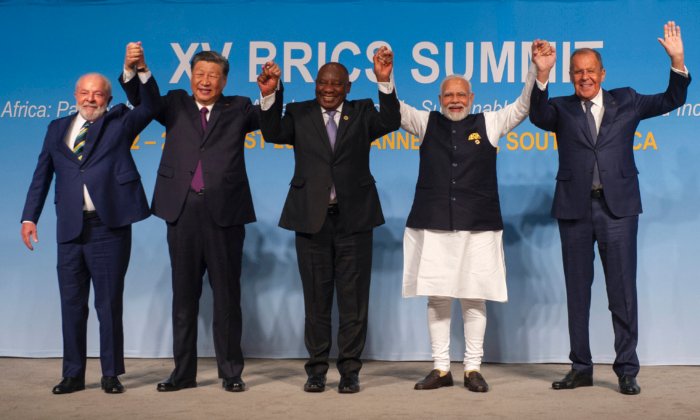Is the US at Risk from the BRICS?
Commentary:
The recently concluded BRICS summit, which includes Brazil, Russia, India, China, and South Africa, has extended an invitation to Argentina, Egypt, Ethiopia, Iran, Saudi Arabia, and the United Arab Emirates to join the group. This development has sparked speculation about the potential impact on the U.S. dollar as a global reserve currency, as well as the International Monetary Fund. However, there are several key points that need to be clarified.
Many political analysts believe that China tends to lend, invest, or provide support without expecting much in return. While it is a major economic power, China has not expressed interest in making the yuan a global reserve currency. Its currency, the yuan, is tightly managed and accounts for only 5% of global transactions, according to the Bank of International Settlements. Additionally, both China and Russia have capital controls, which makes it impossible for their currencies to become global reserve currencies. To have a stable fiat currency, more than just solid gold reserves are required. It is essential to guarantee economic freedom, investment, legal security, and the free movement of capital, as well as maintain an open, transparent, and diversified financial system.
Furthermore, China and Russia are more demanding and rigorous lenders than many politicians realize. Contrary to the notion that joining these countries would result in free money, it is important to recognize that China and Russia are not likely to sacrifice their national currencies by diluting them with issuers who have a questionable track record in controlling their monetary imbalances. Over the past decade, the currencies of the guest countries in BRICS have depreciated significantly against the U.S. dollar. Therefore, combining weak currencies does not create a strong currency. However, increasing the global use of the yuan or the ruble is more feasible.
It is worth noting that the Russian ruble has also performed poorly in the past decade, despite having a relatively prudent central bank. For a fiat currency to be stable, the issuer must defend it as a reserve of value, an accepted payment method, and a unit of measure. Freedom of capital and independent institutions that provide legal security to domestic and international investors are crucial.
Moreover, it appears that China has no interest in taking on the challenges required to become a global reserve currency, such as establishing a financial and monetary system with a high level of independence from political power. Instead, China may focus on expanding the use of the yuan through its financial system and lending to partner nations. The success of the U.S. Federal Reserve as the world-leading central bank can be attributed to its relative independence from the state and public management. However, it is important to highlight that joining BRICS countries with governments advocating uncontrolled public spending and monetary imbalances would not lead to a stable currency, unless they implement a similar model to the euro. Yet, this is unlikely considering the differences among BRICS and their guests.
Creating a BRICS alternative currency would pose significant challenges. China and Russia would face difficulties in imposing fiscal and monetary policy restrictions on their partners. The euro’s success as a fiat currency can be attributed to democracies with independent institutions, economic freedom, and legal certainty aligning their policies for a common project. This has created a solid currency that ensured stability and avoided past inflationary spirals. However, replicating this success with BRICS and their guests seems unlikely.
China, on the other hand, has the potential to increase its global leadership through rigorous monetary and fiscal policies. As the strongest lender among the BRICS countries, China may strengthen its position. However, it is unlikely to jeopardize the stability and security of its population by investing in a new currency. China may instead leverage its financial strength to lend, expand domestically and internationally, and access abundant and cheap commodities.
In the United States, the credibility of the U.S. dollar may be at risk if the government continues to generate massive deficits. If the government undermines the fiscal credibility, institutional independence, and economic freedom of the U.S. dollar, it could potentially lose its reserve status. However, the end of the U.S. dollar as a reserve currency is not likely to come from competition with another fiat currency, as governments’ temptation to devalue their currencies is too strong. Independent currencies may play a role in the future.
Source link




